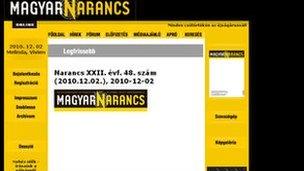Hungary sees blank page protest over media bill
- Published

Magyar Narancs ran a blank front page in its online edition on Thursday
Several Hungarian newspapers have published blank front pages or cartoons in protest at a bill which they say would restrict media freedom.
The legislation now being debated in parliament would allow the official media watchdog to impose heavy fines on privately run publications.
There would be sanctions for unbalanced coverage or breaches of rules on coverage of sex, violence or alcohol.
The government says the law will bring about a more balanced media.
It would "give the new media authority absolute control" over coverage, said Endre Bojtar, editor-in-chief of liberal political weekly Magyar Narancs.
The online edition of the paper ran a blank page on Thursday.
Zoltan Kovacs, editor-in-chief of the political and literary weekly ES, said the bill was clearly aimed "against journalists, against transparency and against the profession as a whole".
Under the new legislation, Hungarian media outlets will have to fill at least half of their programming with European productions, rather than those from overseas, while radio stations will have to dedicate at least 25% of airtime to Hungarian music.
One proposal in the bill is to allow the Media Council - whose current members are all government nominees - to issue fines which can only be appealed against after they have been paid.
Fines which could total the equivalent of tens of thousands of dollars could make it all but impossible for some publications to remain in business.
The aim is to "guarantee the freedom of members of the [media] branch, while protecting the interests of the community", said parliamentary deputy Erzsebet Menczer, one of the authors of the bill.
Gabor Gavra, editor of the online news site hirszerzo.hu which is joining the protest, said the bill was too vague.
"We don't know what the exact rules will be, but even the possibility that we will be at the mercy of the whims of the council is distressing," he added.
Parliament began debating the bill on Wednesday and is expected to approve it on 13 December.
It is supported overwhelmingly by the centre-right government parties.
Correspondents note that the government led by Prime Minister Viktor Orban of the Fidesz party has already used its two-thirds majority in parliament to strip the constitutional court of most of its powers to rule on tax and state budget issues
It has also amended the constitution to fit its own legislative plans and has made it possible to name several officials, including the head of the new media authority and the chief prosecutor, to unusually long, nine-year terms.